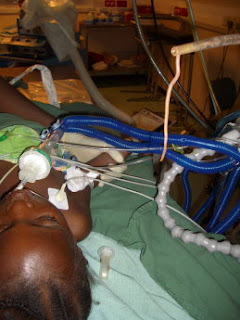 During my current position as an anaesthetist with Mercy Ships serving in Liberia, West Africa, I was a little shocked at what I recently found in a child’s mouth before extubation. Upon routine suctioning of the pharynx following a cleft palate repair, apart from the usual blood and secretions one normally retrieves, I was greeted by 2 intestinal roundworms (Ascaris Lumbricoides) each approximately 15 cm long.
During my current position as an anaesthetist with Mercy Ships serving in Liberia, West Africa, I was a little shocked at what I recently found in a child’s mouth before extubation. Upon routine suctioning of the pharynx following a cleft palate repair, apart from the usual blood and secretions one normally retrieves, I was greeted by 2 intestinal roundworms (Ascaris Lumbricoides) each approximately 15 cm long.Ascaris is one of the most common parasites found in humans and it is estimated that 25% of the world’s population is infected with this nematode. The worms are a potential cause of airway obstruction and it is worth considering this in patients returning from or living in areas of endemic parasitic infestation(1).
Nigel Barker m/v Africa Mercy, Liberia, West Africa
1. Faraj JH. Upper airway obstruction by Ascaris worm. Canadian Journal of Anaesthesia 1993;40:471.



5 comments:
Nigel
Pretty bizarre.
Do they dwell in the stomach? What made them appear in the pharynx? Was it something to do with the operation? Can you tell if there are any remaining in the patient? Do they attach themselves to the host? Questions Questions Questions.
George
Okay, I just read about it on the internet. All you wanted to know. Except why the worm came into view during the operation
George
Hi George
The thought is that the anaesthetic agents provoke them somehow and also relax the sphincter between the stomach and the food-pipe (oesophagus). The patient is also lying flat and they tend to cough a little at the end of the operation because of the breathing tube which was about to be removed. This helps force them into the pharynx. Fun times!
Nigel
WOW! WHAT!!! Nigel actually posted something!!!???
I'm finally surprised (and now -a-days)...and that takes a lot for me!
Nigel posting...(shaking my head in disbelief) I knew it had to be something like this before he would 'come out of the uh...operating room'.
Yay! more medical stories please.
Post a Comment